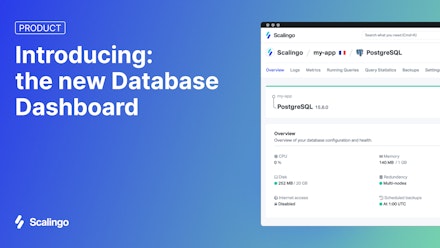Release of Scalingo CLI 1.0.0

After several pre-release of our command line client scalingo commonly refered as Scalingo CLI, we are releasing the first stable version: 1.0.0. It is now simpler than ever to access your databases.
 <!-- more -->
<!-- more -->
New features
Database consoles
We are providing MongoDB , PostrgreSQL , MySQL , Redis and Elasticsearch database instances. All of them except Elasticsearch are providing a REPL (Read-Eval-Print-Loop) utility to access and modify the data manually when required. In this release we have added helpers to access these different tools. It is as simple as running scalingo -console. The utility will fetch your environment variables and analyse them to directly run a one-off container with the REPL correctly configured in it.
So, the following new commands have been added:
$ scalingo -a app mongo-console
$ scalingo -a app mysql-console
$ scalingo -a app pgsql-console
$ scalingo -a app redis-console
Collaborators management
So far, collaborators of an application could only be managed through our web dashbaord. We’ve added in this release three commands to handle them using the scalingo utility.
List all the collaborators of an application:
$ scalingo -a app collaborators
Add a specific user as collaborator of an application:
$ scalingo -a app collaborators-add user@example.com
Remoke the permission of collaboration from an user:
$ scalingo -a app collaborators-remove user@example.com
HTTP(S) Proxy handling
Before today, it was not possible to use the CLI behind a proxy. We know it has been inconvenient to some users who are behind a enterprise proxy. Modifications have been done to let you configure the proxy.
You just have to configure the http_proxy and https_proxy environment variables in your current terminal. These variables are standard and commonly used by a large range of tools including curl or wget
Example:
$ export http_proxy=http://10.0.0.254:8080
$ export https_proxy=https://10.0.0.254:8080
$ scalingo apps
Several bugfixes
Obviously, several bugfixes have been applied, for instance, you can know follow the logs indefinitely, it won’t stop after 30 seconds only.
Complete CHANGELOG
You can find our complete changelog on GitHub: https://github.com/Scalingo/cli/releases/tag/1.0.0
As useful as our web dashboard
Today, our command line utility has all the features of our dashboard. If you are a command line aficionado, you can base all your workflow on this tool, no more need to use our web interface. Here are a few use cases:
First, you’d like to link a domain name with one of your application:
$ scalingo domains-add app.product.com
Later, you decide to setup your own HTTPS certificate for this domain name as you’d like your users to have a secure connection when reaching your app.
$ scalingo domains-ssl --cert /path/to/cert.pem --key /path/to/key.pem app.product.com
If you wish to follow the logs of your application because you have detected some bugs and you wish to follow what’s happening
$ scalingo logs -f
The amount of users is increasing and you feel that your application is a bit slow to answer, you can scale it in an instant
$ scalingo scale web:2
Finally, you think that 512MB containers are not enough, your application is becoming heavier and its execution needs more memory, so you decide to scale verticaly your application
$ scalingo scale web:2:L
Those are finally only examples of what you can do with this tool. We’d love to know what you’d like to do with it or your ideas of improvements. It’s open-source, don’t hesitate to create issues on the project GitHub
Just another API consumer
To conclude, get in mind that our dashboard and our command line clients are just consumers of our public API. It’s documentation can be found here: http://developers.scalingo.com/. We’ve already talked about the possibilities created by this API, those clients are only examples of what we can do with it. If you want to automatize specific processes, build your tools and be also an API consumer!
Installation procedure
Go to http://cli.scalingo.com



